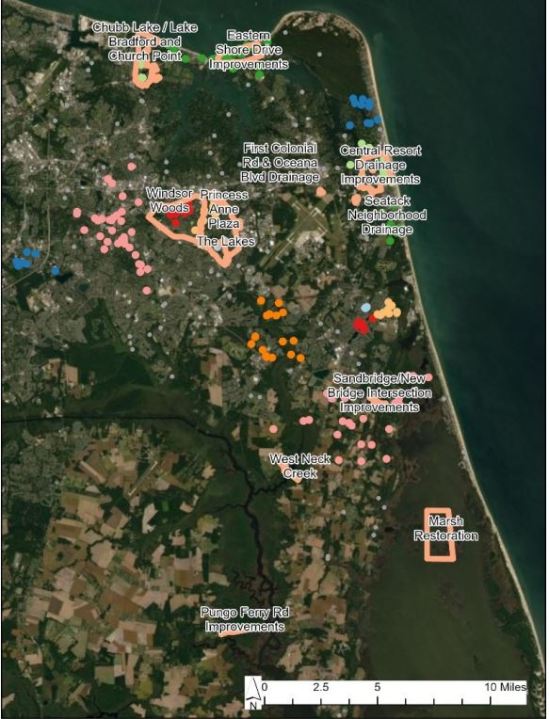VIRGINIA BEACH, Va. (WAVY) — Are Virginia Beach residents willing to have projects aimed at preventing flooding completed faster, in exchange for paying more each month in real estate taxes?
In essence, that’s the core of the bond referendum question that concludes this fall’s general election ballot.
However, some would argue its implications are far more significant than that, with those advocating for the proposal’s passage calling it essential for Virginia Beach to be a viable community in the future.
Without additional flood mitigation projects, annualized losses from floods in Virginia Beach are projected to grow from about $75 million to $350 million by 2060 according to a recent analysis conducted by Old Dominion University.
Many city residents will not soon forget Hurricane Mathew in 2016, which brought more than 13 inches of rain to parts of the city and massive flooding.
Since then, the city has spent more than $4 million to study how the city could fight back against the foot and a half of sea level rise Virginia Beach could expect in the next 30 to 60 years.
A report on sea level rise from Dewberry, an engineering consulting company, that came back with proposed solutions — including massive flood gates, new development guidelines and “green infrastructure” improvements — altogether will cost more than the city’s yearly $2.2 billion budget.
If referendum is approved
If a majority of city voters choose to vote “yes” on the question, the city will borrow $567.5 million to fund 21 flood protection projects that’ll be completed in six to seven years.
The projects, which vary from the construction of new pump stations to the planting of new marshlands in Back Bay, were chosen by city staff either because of their ability to address significant community flooding concerns or because of their ability to be “shovel ready” according to city staff. The individual projects range in cost estimates from $940,000 to improve drainage on Eastern Shore Drive to more than $92 million to improve drainage in the central resort district at the Oceanfront.
In the ODU analysis, economists found the construction itself could result in an economic impact of $371.5 million and 3,300 jobs in the next decade.

However, it’s the taxpayers who will fund it all.
The city estimates that in order to repay the general obligation bonds, the city real estate tax would need to increase between 4.3 and 6.4 cents per $100 of a home’s assessed value. That would bring the city’s rate to, at most, $1.05 per $100 of a home’s assessed value, which is currently the rate of neighboring Chesapeake.
That means a homeowner could expect to pay $10 to $14 more per month or $115 to $171 per year on their real estate taxes.
It would be the first real estate tax rate increase since 2019 in the city. This past year, the real estate tax rate was lowered.
Still, raising taxes is hardly popular, especially in conservative-leaning Virginia Beach.
But in this case, even the city’s most fiscally conservative political figure is urging people to vote “yes.”
“It’s a necessity and it is also a great value,” City Councilman John Moss said. “We’re not paying more money for the same level of service, which I always fight against. We are delivering greater value and what most people don’t realize, if we got hit by a 100-year flood today. 63% or 161 square miles of our city would flood.”
Moss said climate change is real and voters need to know that the current drainage system won’t protect property or residents long-term.
“While half a billion sounds like a lot, when you look at the damages from a flood that has hit some other communities in our country, that’s a small sum,” Moss said. “If we don’t upscale and meet the threat, our homes and our businesses are going to flood and Virginia Beach will not be a viable community.”
Knowing that people are skeptical, Moss along with Councilman Guy Tower led the charge in having City Council pass a resolution that commits the city to further action if the referendum passes.
Within three weeks of the election, the City Council would:
- Adopt a comprehensive financial plan to pay the referendum debt and ensure all of the extra money generated by the tax rate increase is “lock boxed” for only stormwater improvements, and future stormwater improvements.
- Establish a citizen oversight board that will receive monthly briefings and provide City Council with briefings every two months on the status of projects.
- Amend the city’s comprehensive land use plan and require the planning department to recommend any new proposed development that generates “a net increase in water discharge demand” be denied.
- Vote to freeze the stormwater management fee through 2028.
“There is some firewall there, that will protect the value of their money,” Moss said.
He also pointed out that the faster completion of the projects will enable homeowners to be able to get preferred risk status and the cheapest rate for flood insurance for this community under the new FEMA flood insurance model.
“Ask anyone in [Princess Anne] Plaza who lost their home and had 3 feet of water in it, if it’s not worth $14 a month to not have your home flood,” Moss said.
If the referendum is defeated
Residents vowing the vote against the referendum say the city hasn’t wisely spent the money it already takes from them.
Moss, who often rallies against certain spending on the dais, partly agrees.
“Yes, have we spent some money on things that I wouldn’t have spent money on? But I don’t have a time machine. I can’t go back and erase those expenditures, but I also can’t make the rain not come. So I’m not going to cut off my nose to spite my face,” Moss said. “And we’re going to do this in 10 years, versus 25 to 30 years. Do we really want to chance for 30 years?”
Residents currently pay an average of 49.3 cents a day in stormwater fees, garnering the city roughly $40 million a year.
Moss said if the referendum fails, he will do something quite outside of his character.
“I will be voting to increase the stormwater management fee,” Moss said. “We’re not going to be able to sit back and let our current legacy drainage system not be properly maintained.”
The city has set up a website that answers frequently asked questions and details specifics about all the projects being proposed.
Several informational meetings have also been held and the city has set aside an additional $150,000 for advertising of the referendum.
“This is a long-term multi-generational commitment,” Moss said. “I don’t want someone saying later, if I only would have known, I would have voted ‘yes.'”
Download the WAVY News App to keep up with the latest news, weather and sports from WAVY-TV 10. Available in both the Apple and Google Play stores.










































































































